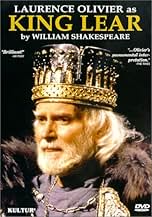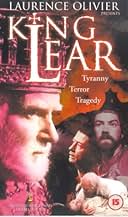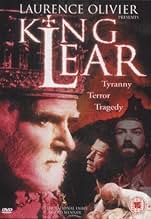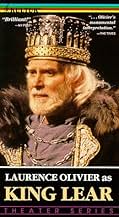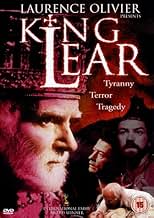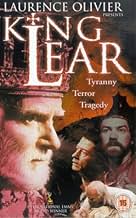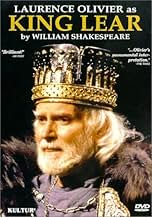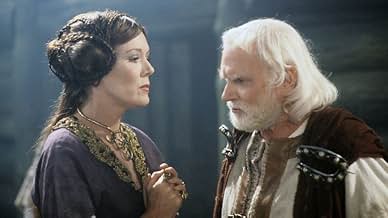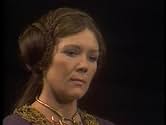Aging King Lear invites disaster when he abdicates to his two disloyal and obsequious daughters while rejecting the one who truly loves him.Aging King Lear invites disaster when he abdicates to his two disloyal and obsequious daughters while rejecting the one who truly loves him.Aging King Lear invites disaster when he abdicates to his two disloyal and obsequious daughters while rejecting the one who truly loves him.
- Won 1 Primetime Emmy
- 2 wins & 3 nominations total
- Director
- Writer
- All cast & crew
- Production, box office & more at IMDbPro
Featured reviews
An all-star cast takes on Shakespeare's greatest tragedy. Laurence Olivier is Lear -- once a mighty king, now a weak, jealous old man. Tired and in need of rest, he divides his kingdom among his three daughters. Cordelia, the youngest, is good and kind, while Regan and Goneril are wicked schemers who soon turn against the king and try to murder him! Lear has loyal friends, like Kent the noble, and his jester, the Fool. Colin Blakely makes Kent into the perfect, rugged sidekick, as brave and reliable as Sam in LORD OF THE RINGS. And John Hurt makes the haunting, half-crazed fool as helpless and pitiable as Gollum, without all the creepy sliminess.
But the real stars of the play are actually the villains. Diana Rigg is delicious as Regan, the younger of the two "wicked sisters." Even when she is shiveringly evil, (joking about Gloucester's pain as she pokes out his eyes!) she remains a stunningly desirable woman. And the twisted affair between Regan and the studly but wicked Edmund is much more erotic and involving than in most productions. Robert Lindsay captures the gigolo side of Edmund perfectly, always teasing and tempting and making poor love-struck Regan literally pucker up to kiss the empty air. Diana Rigg really plays all sides of the character -- watching her pout and sulk in her tent would be sweetly endearing if she weren't so truly and completely cruel. As a result the viewer is spellbound, unable to resist the evil but horrified by the inevitable tragedy.
With an all-star cast, original scenery and a haunting musical score, this bold production is Shakespeare at the summit!
But the real stars of the play are actually the villains. Diana Rigg is delicious as Regan, the younger of the two "wicked sisters." Even when she is shiveringly evil, (joking about Gloucester's pain as she pokes out his eyes!) she remains a stunningly desirable woman. And the twisted affair between Regan and the studly but wicked Edmund is much more erotic and involving than in most productions. Robert Lindsay captures the gigolo side of Edmund perfectly, always teasing and tempting and making poor love-struck Regan literally pucker up to kiss the empty air. Diana Rigg really plays all sides of the character -- watching her pout and sulk in her tent would be sweetly endearing if she weren't so truly and completely cruel. As a result the viewer is spellbound, unable to resist the evil but horrified by the inevitable tragedy.
With an all-star cast, original scenery and a haunting musical score, this bold production is Shakespeare at the summit!
I am becoming increasingly aware that some of my favorite actors are just dumb, that they don't have a vision as grand as the work they are a part of. I don't know that this should be so surprising, given what it takes to be an actor.
Olivier both acts and directs here, and what we have is a shame because he just doesn't understand this play, the important half anyway. Half of the play is about the relationships among people, specifically about the parent-child relationship and its regal surrogate of fealty (the fool, Kent and Gloucester to the King). When Olivier is relating to one of these, he is marvelous.
But half of the play is about Lear's relationship to unseen demons, sprites, devils. He sees and relates to these as intensely and with as much duration as with the daughters. (This is mirrored by Gloucester who cannot see them.) In this part of the play, roughly the middle, the language comes alive as it takes us into the Elizabethan equivalent of science fiction. This is some of the best language in Shakespeare, which is to say the best stuff anywhere.
And what does Olivier give us? Mumbling, sometimes under the wind noise. The fulcrum of this magic is the sequence with the Fool and Poor Tom. It is the heart of the magic, which Shakespeare later amplified with the `trial.' Olivier cuts most of that, and gives us a muddle. (Literally, Tom wallowing in the mud.)
The music is horrid, as it is with his much earlier Hamlet. The swordplay is bombastic. The sets are cheesy, especially the faux Stonehenge. If he understood the importance of Stonehenge, why drop the notion of magic in the core of the play? I just don't get it: I don't understand how he couldn't get it.
At the very last page, Lear kneels over the dead Cordelia and says `my poor fool is hanged.' Then looking for life in a magical revival asks to have HER button undone, which likely undoes a garment like that we have seen on the long-lost Fool. Rich stuff that, as big a twist as `Sixth Sense.' But Olivier slurs over on his way to rambling about dogs and rats and then asks for HIS button to be undone. My my.
Advice: Lear is one of the very best of the plays. I'll grant that Olivier is a fine actor, but this is a very poor offering indeed. Ignore.
Olivier both acts and directs here, and what we have is a shame because he just doesn't understand this play, the important half anyway. Half of the play is about the relationships among people, specifically about the parent-child relationship and its regal surrogate of fealty (the fool, Kent and Gloucester to the King). When Olivier is relating to one of these, he is marvelous.
But half of the play is about Lear's relationship to unseen demons, sprites, devils. He sees and relates to these as intensely and with as much duration as with the daughters. (This is mirrored by Gloucester who cannot see them.) In this part of the play, roughly the middle, the language comes alive as it takes us into the Elizabethan equivalent of science fiction. This is some of the best language in Shakespeare, which is to say the best stuff anywhere.
And what does Olivier give us? Mumbling, sometimes under the wind noise. The fulcrum of this magic is the sequence with the Fool and Poor Tom. It is the heart of the magic, which Shakespeare later amplified with the `trial.' Olivier cuts most of that, and gives us a muddle. (Literally, Tom wallowing in the mud.)
The music is horrid, as it is with his much earlier Hamlet. The swordplay is bombastic. The sets are cheesy, especially the faux Stonehenge. If he understood the importance of Stonehenge, why drop the notion of magic in the core of the play? I just don't get it: I don't understand how he couldn't get it.
At the very last page, Lear kneels over the dead Cordelia and says `my poor fool is hanged.' Then looking for life in a magical revival asks to have HER button undone, which likely undoes a garment like that we have seen on the long-lost Fool. Rich stuff that, as big a twist as `Sixth Sense.' But Olivier slurs over on his way to rambling about dogs and rats and then asks for HIS button to be undone. My my.
Advice: Lear is one of the very best of the plays. I'll grant that Olivier is a fine actor, but this is a very poor offering indeed. Ignore.
A very good version of _King Lear_ - Olivier plays it poignantly, you can see his Lear's overweening vanity and his profound humility. Robert Lindsay is my favourite Edmund ever - you immediately love him and wish him well despite the fact that he is a b*ftard (in all senses of the word - haha). Dorothy Tutin's Goneril has the most disapproving glare you have ever seen and her frolicking mutton act is painful to watch if you're a middle-aged woman. Hurt's fool is a wee bit too pathetic and Cordelia's weepiness is not appealing -- Diana Rigg's Regan is certainly convincing at getting across the hidden nastiness that outdoes Goneril. Gloucester is quite perfect in his rough affection. I've seen this many times and I still enjoy watching it for the nuances. The fight between Ed and Ed is a little much. It's too bad it looks quite so made-for-TV. I'm looking forward to Branagh blowing all the meanings up into big cartoons for us when he does his version of Olivier's _Lear_.
I had seen King Lear on the stage with Louis Calhern when I was too young to fully appreciate it. The Olivier version was deeper with fine nuances in his performance evidencing his full insight of the meaning of this tragedy. A must for every parent. It teaches one more than all the popular books on parenting.
10Sirona
The whole production was beclouded with grayness, as suits the theme of seeing/sight, yet the acting was elegiac. Diana Rigg and Dorothy Tutin were as seeming kindly as they were brutal. Robert Lindsay's Edmund was as poisonous as he was seemingly loving and loyal. But what I take away most specially was Olivier, as Lear, lifting a lock of his dead Cordelia's hair in his bowed hands to his face, taking a breath, a last scent. I cried. It was a most elegant summary of a parent's loss.
Did you know
- TriviaEsmond Knight (Old Man) previously appeared in all three Shakespearean films directed by Laurence Olivier: Henry V (1944), Hamlet (1948) and Richard III (1955).
- ConnectionsFeatured in The 36th Primetime Emmy Awards (1984)
Details
- Release date
- Country of origin
- Official site
- Language
- Also known as
- 李爾王
- Production company
- See more company credits at IMDbPro
Contribute to this page
Suggest an edit or add missing content

